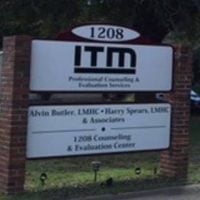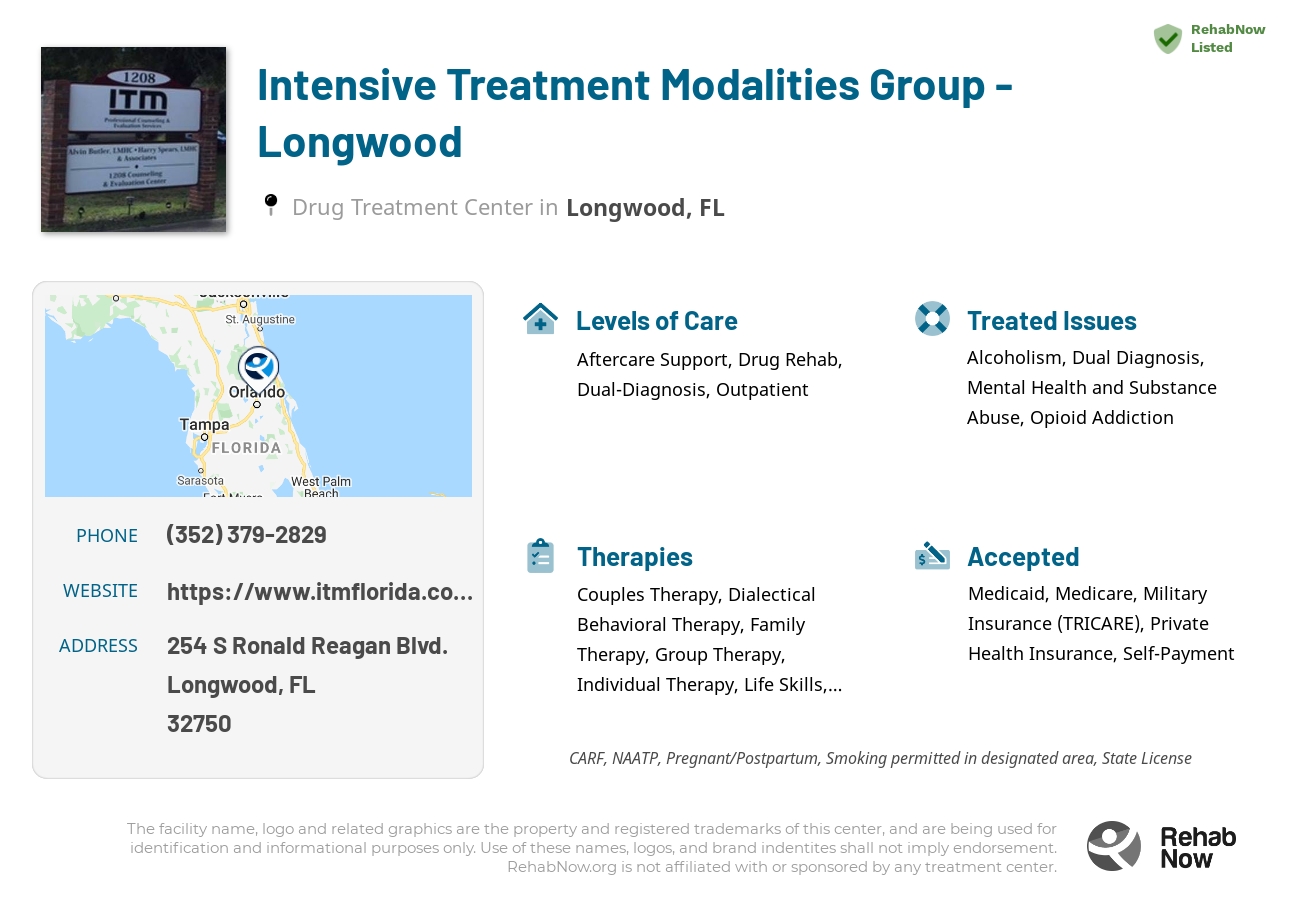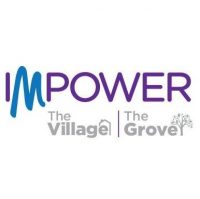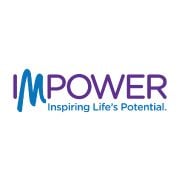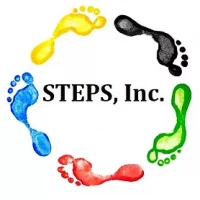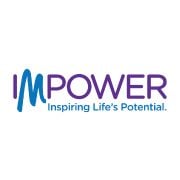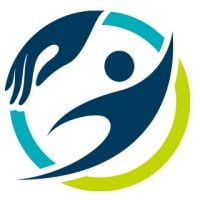Intensive Treatment Modalities Group - Longwood
Drug Rehab Center in Longwood, Florida
The Intensive Treatment Modalities Group in Florida provides specialized and comprehensive addiction treatment programs, personalized treatment plans, evidence-based practices, and accepts private health insurance.
About Intensive Treatment Modalities Group - Longwood in Florida
Intensive Treatment Modalities Group - Longwood is a leading provider of substance abuse treatment programs in Longwood, Florida. Their range of services cater to the needs of those suffering from alcoholism, dual diagnosis, opioid addiction, and drug addiction. Clients have access to a variety of therapies and treatments, such as couples therapy, dialectical behavioral therapy (DBT), family therapy, group therapy, individual therapy, life skills, motivational interviewing, and cognitive behavioral treatment (CBT). Intensive Treatment Modalities Group - Longwood accepts private health insurance and is affiliated with Intensive Treatment Modalities Group.
Their highly experienced staff are committed to providing a safe and comfortable environment for each of their clients. They use an integrated approach to treatment that evaluates physical, psychological and social health in order to develop individualized treatment plans. With this comprehensive approach, customers can rest assured that they are receiving the best and most effective care possible. Intensive Treatment Modalities Group - Longwood provides quality services that can help individuals work towards conquering their addictions and living a healthier lifestyle.
Genders
Ages
Modality
Additional
Conditions and Issues Treated
Opioid addiction has become a significant health problem in the United States. When a person’s life becomes unmanageable because of an opioid addiction, treatment can help them get sober. Treatment includes medical care and counseling.
“With so many people struggling with opioid addiction, we need more care and attention for those who want to quit. Opioid addicts often take opioids when they experience a painful injury – that’s how the cycle starts! When someone begins taking their medication differently than prescribed or takes an excessive amount of drugs, it means they’re hooked on drugs and in danger of overdosing.
The most successful way to beat this is through detoxing from these types treatments at Intensive Treatment Modalities Group - Longwood in . Most facilities start by using medical support during the process while providing counseling services; rehabilitation comes later on after treatment has been completed successfully.
A “dual diagnosis” is when the individual has two medical issues at the same time. The top co-occurring mental disorders with addiction are depression, anxiety, ADHD, bi-polar disorder. Addiction is also considered a mental illness that is not a choice but rather a medical condition. Addiction can be caused by any number of underlying issues.
Dual diagnosis is provided by Intensive Treatment Modalities Group - Longwood to treat addictive tendencies as well as any untreated mental illnesses. This ensures successful long term health and recovery for patients after treatment has been completed.
Dual diagnosis is provided by Intensive Treatment Modalities Group - Longwood to treat addictive tendencies as well as any untreated mental illnesses for people in Florida. This ensures successful long term health and recovery for patients after treatment has been completed.Levels of Care Offered
This center offers a variety of custom treatment tailored to individual recovery. Currently available are Aftercare Support, Drug Rehab, Dual-Diagnosis, Outpatient, with additional therapies available as listed below.
Outpatient programs at Intensive Treatment Modalities Group - Longwood, the Longwood resident can live with their family while continuing with their job or studies. Treatment includes educating the patient on drug abuse, medications, and counseling sessions at the individual or group level. Outpatient treatment plans cover diagnosis, detoxification, management, and counseling. They are a popular option for those who have graduated from inpatient facilities.
Without aftercare support, addicts can easily relapse back into addiction. It is crucial to integrate the addict back into society. Aftercare support should take place after outpatient treatment has ended.
There are a few different types of aftercare support that patients can seek after completing an inpatient treatment program:
- 12 Step Self-help groups (AA, NA)
- Therapeutic communities,
- Long-term, structured sober living arrangements
- Halfway houses (residential treatment centers)
Many different support groups exist for addicts to seek help after treatment. Some are more effective than others, depending on the person’s addiction, background, and other factors.
Therapies & Programs
Individual therapy is a form of counseling where you meet with a trained professional one-on-one. Meeting with a therapist in this setting allows for a personal and trusting relationship to be built. This allows the patient to open up about sensitive or private issues they may not feel comfortable discussing in a group. Individual therapy helps identify the root causes of your addiction, which can help prevent relapse.
Couples therapy for drug addiction is a unique form of therapy that allows family members to work through the emotional issues of their loved one’s addiction together. Family members can support each other while learning how to cope with the addiction and encourage healthy changes. The two will work with a therapist to learn how the addiction affects themselves and the relationship.
Family therapy is often done alongside drug treatment to help addicts stay sober. The goal of family therapy for drug addiction is to create an environment where communication can happen without judgment, hostility, or blame. The therapist will sit with the family so they can learn how to communicate differently and provide new tools for dealing with emotions so that people don’t want to drink or do drugs. It’s important for families to focus on relapse prevention plans during treatment so that if the addict feels like they want to use again, they’ll know what steps they need to take together to prevent it from happening again in the future.
Group therapy sessions are another common addiction recovery service. These group sessions typically involve six to 12 addicts who meet regularly with a trained professional for support and guidance.
During these sessions, the group shares their experiences with one another and provides feedback that can help each member avoid relapse or overcome specific obstacles they are facing in their recovery process. With this type of support and guidance, addicts can feel like they are part of a community that understands their struggles and will help them get through the hard times.
Dialectical Behavior Therapy was developed in the 1980s to treat chronically suicidal individuals. It is a cognitive-behavioral therapy that combines standard DBT with strategies derived from Zen Buddhism, such as mindfulness training.
DBT has been adapted for use with other types of psychiatric problems, including eating disorders, substance abuse disorders, borderline personality disorder, posttraumatic stress disorder (PTSD), and other personality disorders. Dialectical Behavior Therapy is considered a psychosocial treatment of BPD. This means that while it can be used alone or in conjunction with drug treatments, DBT does not rely on medications to treat the disorder. Instead, DBT aims to help patients change their thinking and behavior.
Cognitive Behavioral Therapy (CBT) focuses on the underlying thoughts and behaviors that caused the problem of addiction in the first place and may cause a relapse. Negative feelings are common in drug abuse disorders, but they can lead to co-occurring disorders if not recognized. CBT involves strategies that help to change the behavior pattern by restructuring negative thoughts into positive ones. It helps to remove these feelings, and it provides long-term benefits. Also, CBT promotes self-awareness and self-control. It can be administered as a monotherapy or as part of combination therapy.
CBT can improve the patient’s mood, reduce drug cravings and boost success rates on treatment plans. Regular practice can help individuals handle negative attitudes, thoughts, and feelings without turning to drugs or alcohol. The core belief of Cognitive Behavioral Therapy (CBT) is that one’s moods, behaviors, and actions are all connected. Individuals can improve their quality of life using CBT. It helps addicts understand the patterns of thought and feelings that cause them to use drugs or alcohol and develop a healthy response.
It’s not as simple as quitting drinking or using drugs and expecting the hard part to be over. Many addicts in recovery have discovered that they need to improve skills such as time management, organization, communication, socialization, and self-esteem. Learning certain life skills can help those who are struggling with addiction.
Payment Options Accepted
For specific insurance or payment methods please contact us.
Is your insurance accepted?
Ask an expert, call (888) 674-0062
Intensive Treatment Modalities Group Associated Centers
Discover treatment facilities under the same provider.
- Intensive Treatment Modalities Group - Pinellas Park in Pinellas Park, FL
- Intensive Treatment Modalities Group - Orlando in Orlando, FL
- Intensive Treatment Modalities Group - Palatka in Palatka, FL
- Intensive Treatment Modalities Group - Saint Augustine in Saint Augustine, FL
- Intensive Treatment Modalities Group - Starke in Starke, FL
Learn More About Intensive Treatment Modalities Group Centers
Additional Details
Specifics, location, and helpful extra information.
Longwood, Florida 32750 Phone Number(352) 379-2829 Meta DetailsUpdated November 25, 2023
Staff Verified
Intensive Treatment Modalities Group - Longwood Patient Reviews
There are no reviews yet. Be the first one to write one.
Longwood, Florida Addiction Information
Florida is one of the nation's epicenters for substance abuse and drug-related overdoses. In 2014, around 410,000 Florida residents were addicted to drugs and alcohol. Over the last 10 years, 12% of all deaths in the state were attributed to substance abuse. Treatment admissions for alcohol reached 24,329 patients in 2016, and 2.5% of Florida high school students admitted to using crack cocaine.
About 2,000 people in Longwood, FL are addicted to drugs. There were 398 opioid-related overdose deaths in Longwood, Florida, in 2016. Heroin-related deaths shot up by 50% in 2009. The most commonly abused drugs in Longwood include cocaine, heroin, marijuana, and methamphetamines. Many drug treatment options are available to get sober in Longwood. Inpatient rehab facilities offer a more immersive treatment experience while outpatient rehab facilities allow for more flexibility.
Treatment in Nearby Cities
- Palm Bay, FL (65.0 mi.)
- Oakland Park, FL (189.8 mi.)
- Wauchula, FL (84.3 mi.)
- Thonotosassa, FL (72.8 mi.)
- Wimauma, FL (89.4 mi.)
Centers near Intensive Treatment Modalities Group - Longwood
The facility name, logo and brand are the property and registered trademarks of Intensive Treatment Modalities Group - Longwood, and are being used for identification and informational purposes only. Use of these names, logos and brands shall not imply endorsement. RehabNow.org is not affiliated with or sponsored by Intensive Treatment Modalities Group - Longwood.
